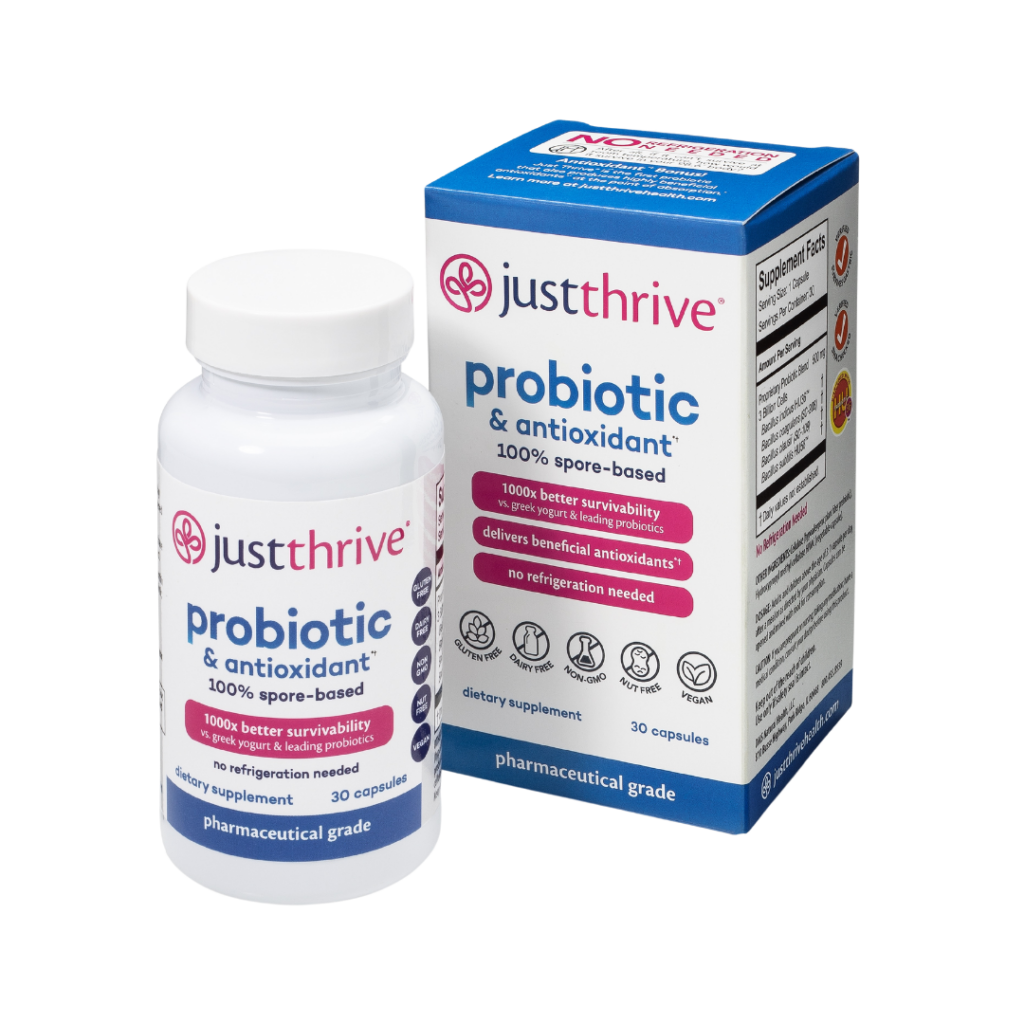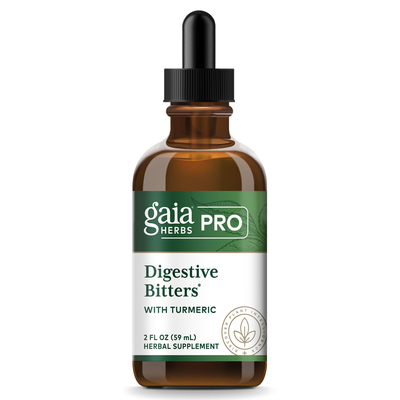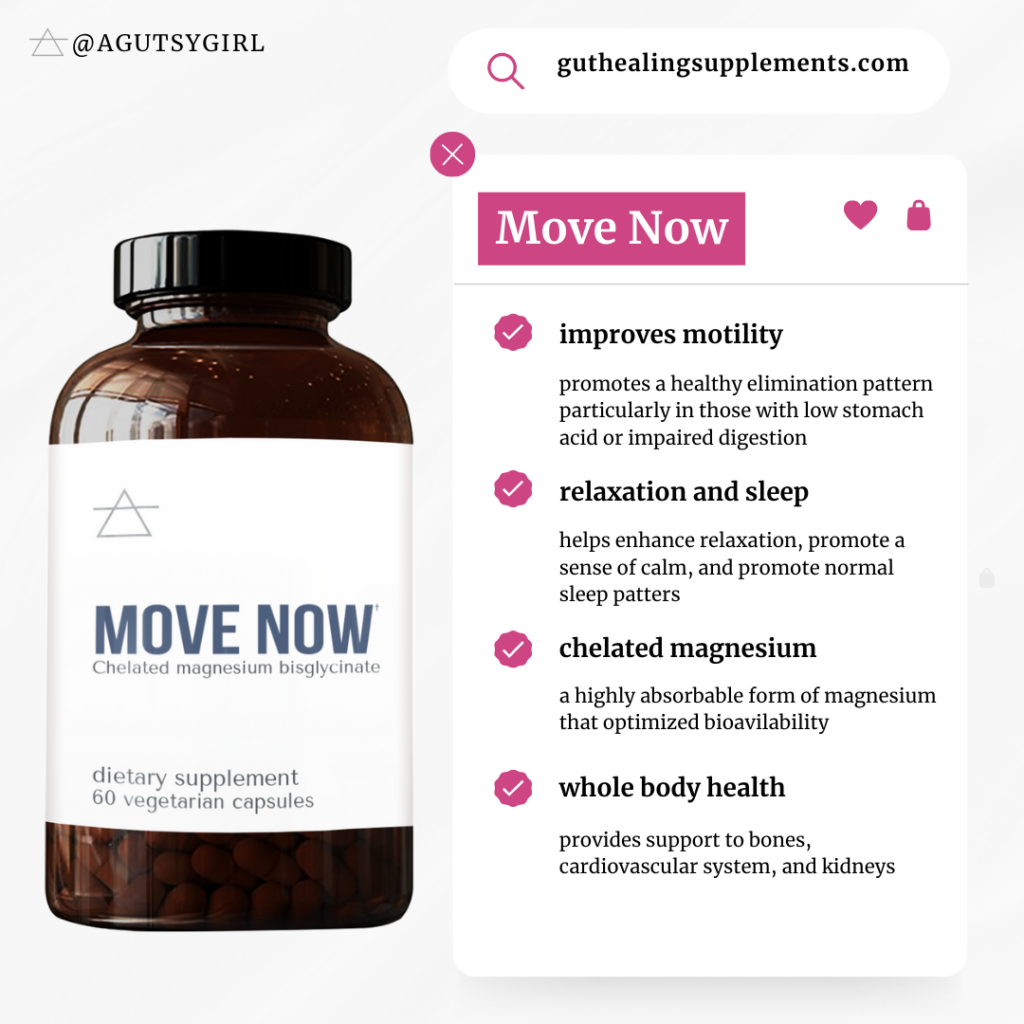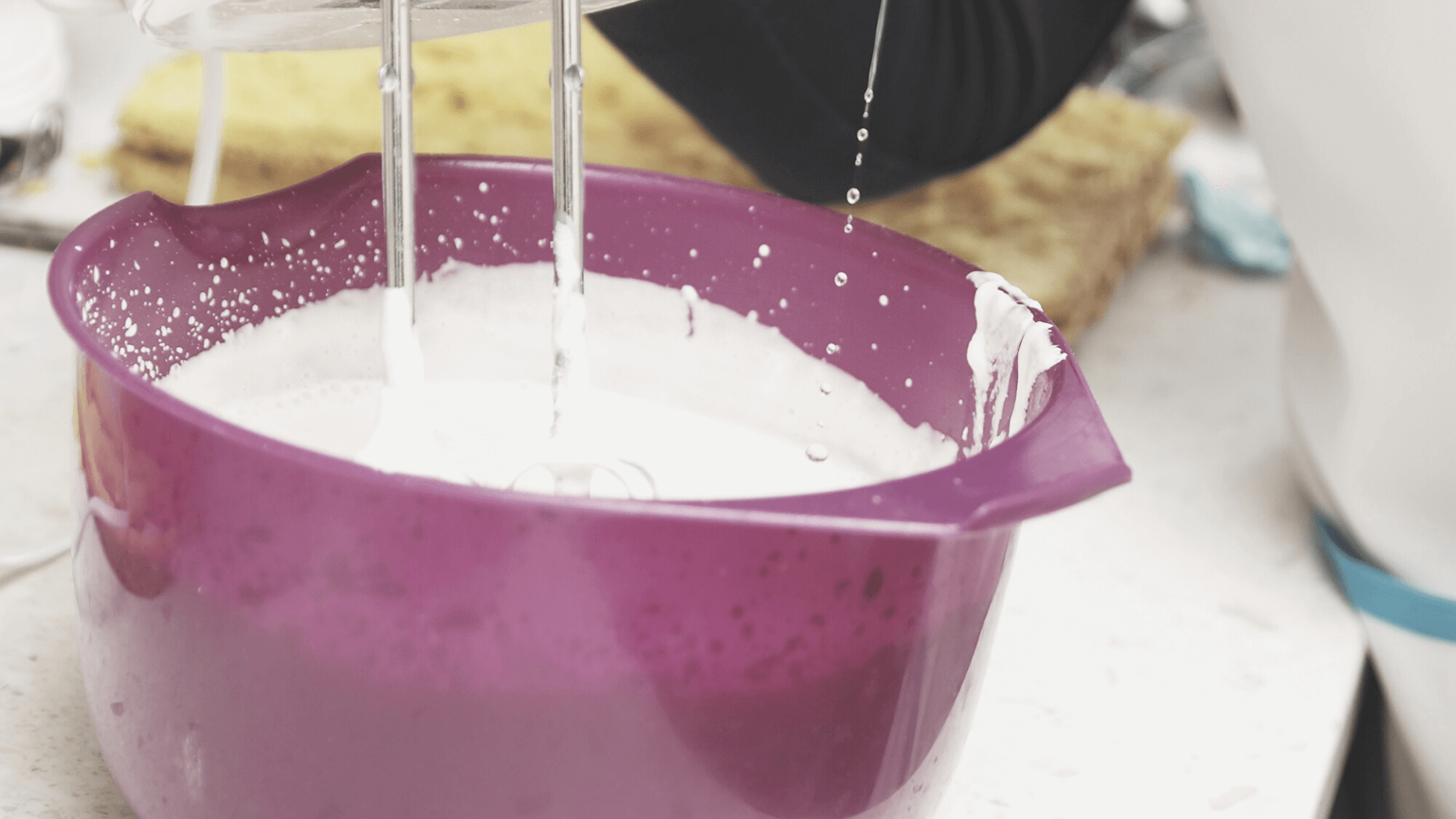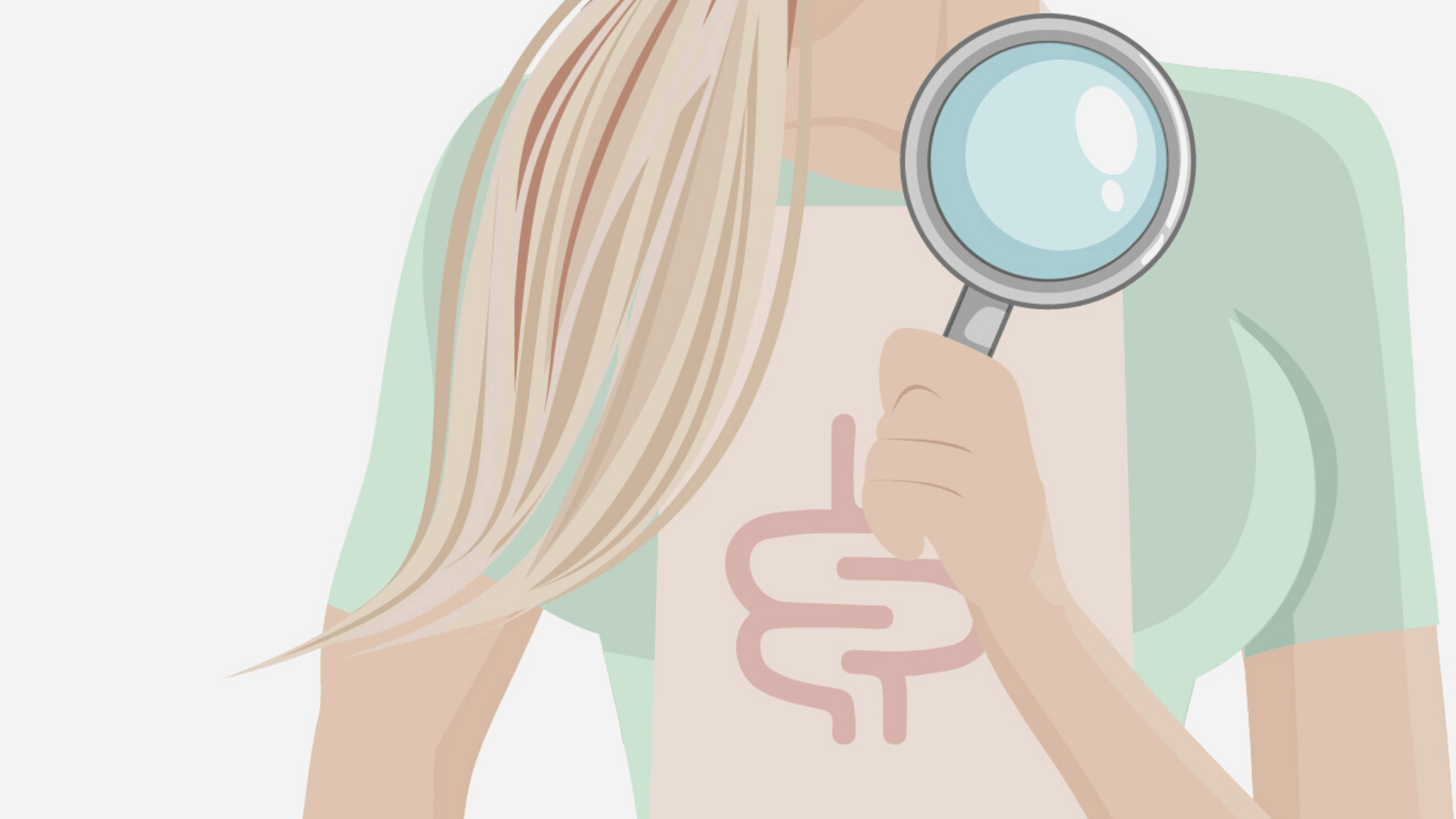Consider this your official A Gutsy Girl guide to gut healing supplements.
The Truth You Might Not Want to Hear
As I floated through the world of Instagram recently, I stumbled upon a post which went into detail about why the approach for supplements was all wrong.
And you know what?
Even though I have my own supplement line, I agreed with the post.
You might be surprised to hear that.
But I agreed.
And I agreed because the point of the post was that it takes more than supplements. And the long-term approach requires addressing the entire puzzle, not just throwing a supplement at the current problem.
It’s for this exact reason why I created Gut Healing: ELEVATED.
Because…..I know that the lifestyle factors and lifestyle changes outweigh everything else.
Because…..I realize you can’t heal something if you don’t even know where that something derives from.
And because….I have been there, done that, healed it all – and supplements were only a small part of what truly got me to the other side of gut hell.
HOWEVER…..
What is a Supplement?
According to the dictionary, here is what a supplement is,
something that completes or enhances something else when added to it
Now, when it comes to health supplements (which is what I’m referring to today in this article), here is what I’m talking about (ref. ASEAN Agreement on Heath Supplements):
Health Supplements” means any product that is used to supplement a diet and to maintain, enhance and improve the healthy function of human body and contains one or more, or a combination of the following:
- Vitamins, minerals, amino acids, fatty acids, enzymes, probiotics and other bioactive substances
- Substances derived from natural sources, including animal, mineral and botanical materials in the forms of extracts, isolates, concentrates, metabolite
- Synthetic sources of ingredients mentioned in (1) and (2)
It is presented in dosage forms (to be administered) in small unit doses such as capsules, tablets, powder, liquid and it shall not include any sterile preparations (i.e. injectables, eye drops).
Real Life: Digestive Health / Health Issues
Taking the above into consideration, I will be 100% transparent in telling you that without the use of strategic supplements on my gut healing journey, I could not and would not have seen significant improvements – some of them occurring seemingly overnight.
That’s what this website is all about — RESEARCH + my personal experiences.
To say that supplements are the only thing one needs to heal chronic conditions is a LIE.
But to say that supplements play no role in relieving digestive symptoms and helping the body return to some form of healthy digestion is also a LIE.
Supplements have always been an effective treatment on the holistic (holistic here meaning – whole body treatment) journey I traveled.
Take all of the above for what it’s worth to you, in this moment on your journey.
Gut Healing Supplements
Click HERE to save this article on gut healing supplements for later.
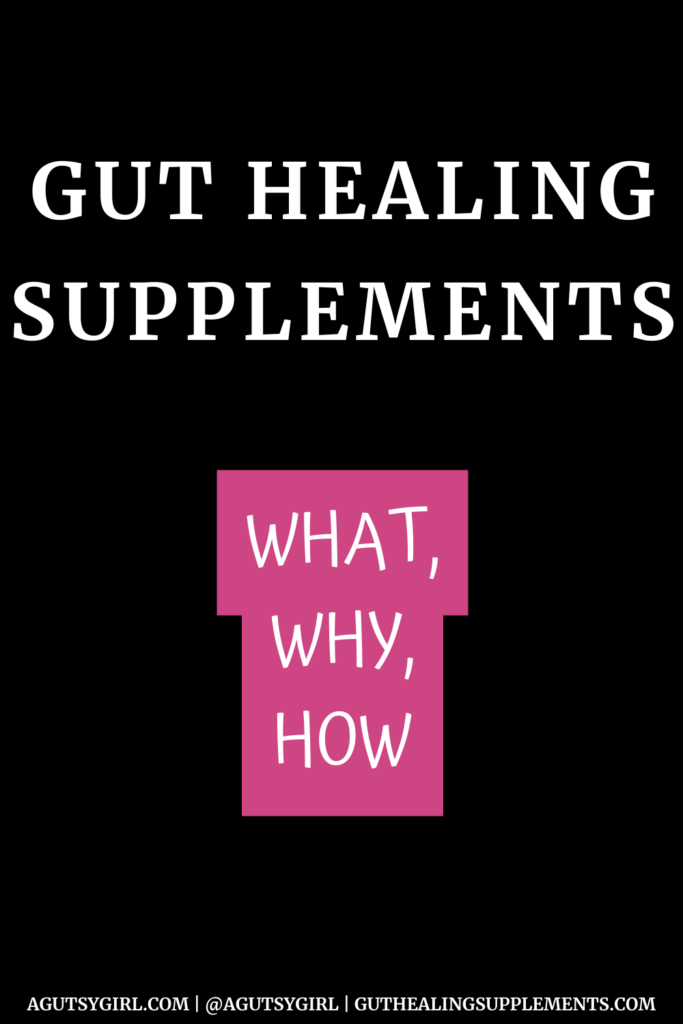
Full disclosure: I also own guthealingsupplements.com, which is a line of gut-healing supplements intended for those with IBS (irritable bowel syndrome) and/or IBD (inflammatory bowel disease).
When you purchase anything from the website, you can always use code AGUTSYGIRL to save 15%.
The gut healing supplements I’m sharing in this article are not solely my own nor can they all be found on guthealingsupplements.com.
But some can, and that’s because the ones we sell are researched for their positive effect on the digestive system and also are ones that gave me results during my own gut-healing journey.
Digestive Enzymes
“Digestive enzymes” is a broad term that includes pancreatic enzymes, plant-derived enzymes and fungal-derived enzymes.
These dietary supplements help turn larger molecules found in foods (carbs, protein and fats) into more easily absorbed particles (such as amino acids, fatty acids, cholesterol, simple sugars and nucleic acids).
In my opinion, they are one of the best ways to see significant improvement immediately because they allow you to eat while giving you the added digestive system support.
Digestive enzymes are helpful for food intolerance and can massively improve your quality of life.
The body can then actually use these particles to function and for energy. To learn more about digestive enzymes read What are Digestive Enzymes?
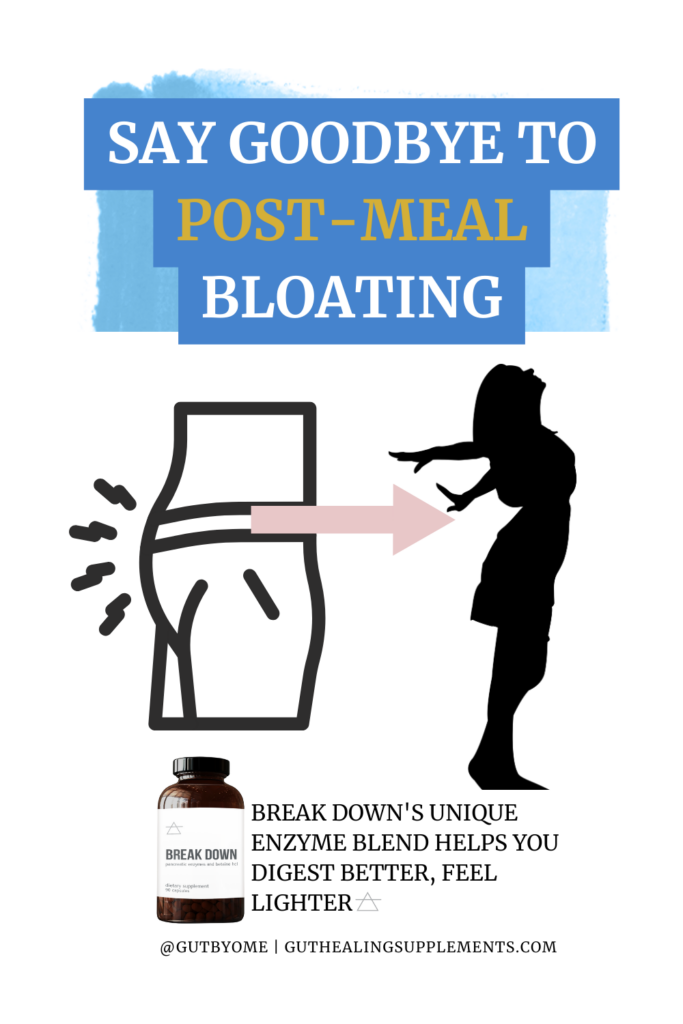
Break Down is a comprehensive formula designed to support optimal digestion and absorption of essential nutrients. This unique formula contains a proprietary blend of digestive enzymes and betaine hydrochloride (HCl) to support the breakdown of proteins, fats, and carbohydrates.
Probiotic Supplements
Probiotics are active cultures of bacteria that can colonize in your gut.
This helps to reestablish healthy levels of bacteria within your small intestine and large intestine, which can be a game-changer for your overall health.
A healthy gut microbiome (the collection of bacteria, yeasts, and other microbes) help not only to digest food, but also to manufacture vitamins, prevent harmful pathogens, regulate immune health and connect to mood.
The integrity of your gut plays a key role in ensuring the rest of your body is functioning at its optimal position.
Most probiotics contain different levels of Lactobacillus, Bifidobacterium, Saccharomyces, Streptococcus, Enterococcus, Escherichia, and Bacillus.
These can be extremely helpful in individuals with irritable bowel syndrome who suffer from bacterial dysbiosis.
This means that the “bad” bacteria have overrun the “good” bacteria and the gut is no longer in its optimal state.
Probiotics can help to regrow friendly bacteria colonies (beneficial bacteria) that push out the bad bacteria.
Source: HERE
My personal preference for probiotics is a spore-based probiotic and the main reasons include: survivability rate + its resistance to antibiotics.
You can learn all about spore based probiotic benefits HERE.
Digestive Bitters
A digestive bitter is an herb that supports digestive function by stimulating bitter receptors on the tongue, stomach, gallbladder and pancreas.
Their primary effect is to promote digestive juices such as stomach acid, bile and enzymes to breakdown food and assist in the absorption of nutrients.
In ayurvedic medicine, digestive bitters are known as “deepaniya dravyas” or “deepana herbs.” According to Ayurveda, digestion plays a crucial role in overall health, and imbalances in the digestive system can lead to various ailments.
Digestive bitters are believed to improve digestion by stimulating the Agni (digestive fire) and enhancing the secretion of digestive juices and enzymes.
Bitters are, just as their name implies, bitter tasting with a bitter flavor; created from bitter herbs.
They are found everywhere from the bar (remember what I told you in Kilometer Zero?) to beauty stores (for healthy skin), and even (most importantly?!) your own medicine cabinet.
Common herbs and botanicals used in digestive bitters include gentian, dandelion, artichoke, burdock root, slippery elm, angelica root, chamomile, fennel, ginger, licorice root, and many others. Each herb may contribute its own unique properties and potential health benefits.
If you’re interested in the full gamut of information regarding bitters, check out What are Herbal Bitters?
Marshmallow Root
Marshmallow (Althea officinalis) is a plant. The leaves and the root are sometimes used to make medicine.
Marshmallow is sometimes used to form a protective layer on the skin and lining of the digestive tract.
Marshmallow root is another soothing supplement that both soothes and repair the gut lining.
It has been found to be beneficial for intestinal permeability (aka leaky gut syndrome), which often goes hand and hand with SIBO.
Made with Gaia-grown® Organic Marshmallow root, this formula is traditionally taken to support a healthy gastrointestinal (GI) tract health.
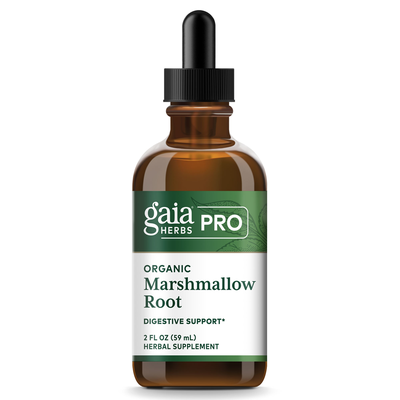
HCl
HCl is hydrochloric acid, and this is actually a supplement for good gut health that so many (unfortunately) do not know about.
According to my studies through the ADAPT program, here is the formal definition,
The stomach produces hydrochloric acid as part of the normal digestive process. The breakdown and absorption of nutrients occurs at an optimum rate only within a narrow range of acidity in the stomach. If there isn’t enough acid, the normal chemical reactions required to absorb nutrients are impaired. Hydrochloric acid is required for proper digestion of protein, carbohydrates, and fat, as well as efficient absorption of vitamins and minerals. Low stomach acid production can be caused by H. pylori infection (the bacterium that causes ulcers), stress, acid-suppressing drugs, a vegetarian or vegan diet, and advancing age.
Chris Kresser also makes note that,
While many people assume that GERD and heartburn are caused by too much stomach acid, research suggests that’s not the case. In fact, in my clinical experience, I’ve found that low stomach acid is a far more likely cause of these conditions.
HCl is one of those gut healing supplements that, had I not been keen on and used, would have kept me in the vicious SIBO cycle and thus never able to get rid of the overgrowth and massive bloat.
I SWEAR by this one.
You can test your own stomach acid levels at home with THIS at home stomach acid challenge.
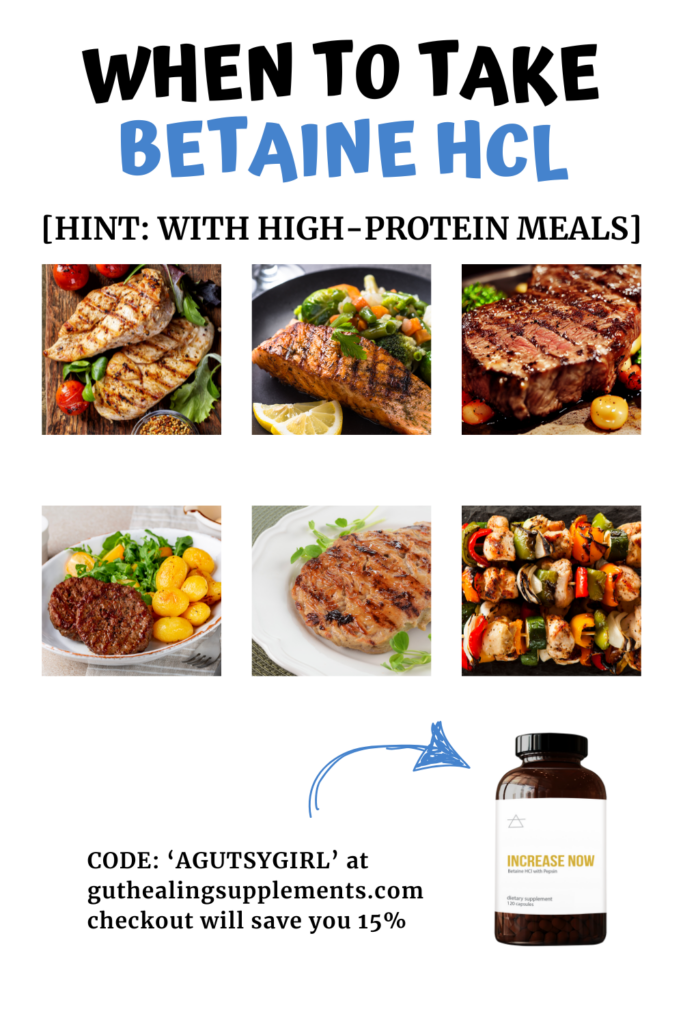
Betaine HCl provides 750 mg of betaine hydrochloride per capsule along with pepsin, a key protein digestive enzyme produced in the stomach. This product is ideal for those who are looking to support their stomach’s digestive function.
Vitamin C
The purpose vitamin C serves is to act as an antioxidant, helping to protect cells from the damage caused by free radicals.
Additionally, we need vitamin C to make collagen. Collagen is a protein required to help wounds heal. I have talked about Collagen at length; wound healing was included.
Finally, vitamin C can improve the absorption of iron from plant-based foods and helps the immune system work properly to protect the body from disease.
You can learn all about vitamin C for gut health.
A powerful, immune-boosting blend of 3 vitamin C rich organic superfoods makes this the most powerful, full spectrum, 100% natural vitamin C on the market with zero synthetic vitamins used.
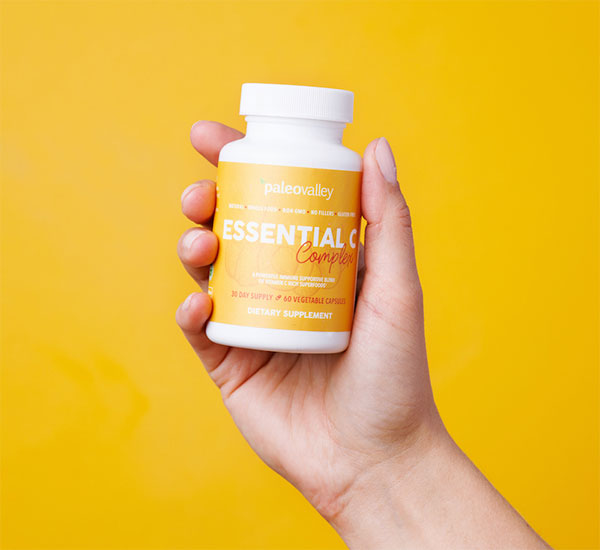
Vitamin D
Most Americans are deficient in essential Vitamin D. Yet more and more studies are revealing why getting enough vitamin D is important.
While most consider vitamin D the vitamin for healthy bones, there is some evidence that Vitamin D can regulate gastrointestinal inflammation and have positive impacts for the digestive tract.
Epidemiological studies show that individuals with higher serum Vitamin D have a lower incidence of IBD, particularly Crohn’s disease.
A deficiency in vitamin D leads to dysbiosis of the gut microbiome and has been reported to cause severe colitis.
However, there is another side to this as well. According to Harvard,
The vitamin D that is consumed in food or as a supplement is absorbed in the part of the small intestine immediately downstream from the stomach. Stomach juices, pancreatic secretions, bile from the liver, the integrity of the wall of the intestine — they all have some influence on how much of the vitamin is absorbed. Therefore, conditions that affect the gut and digestion, like celiac disease, chronic pancreatitis, Crohn’s disease, and cystic fibrosis, can reduce vitamin D absorption.
While vitamin D can be for gut health, Harvard suggests that without prior gut healing, you might not even be absorbing it.
The idea around D3 for gut health is sort of a chicken and egg scenario. In order to reap the benefits of this important nutrient, the state of your digestive system must be in good health.
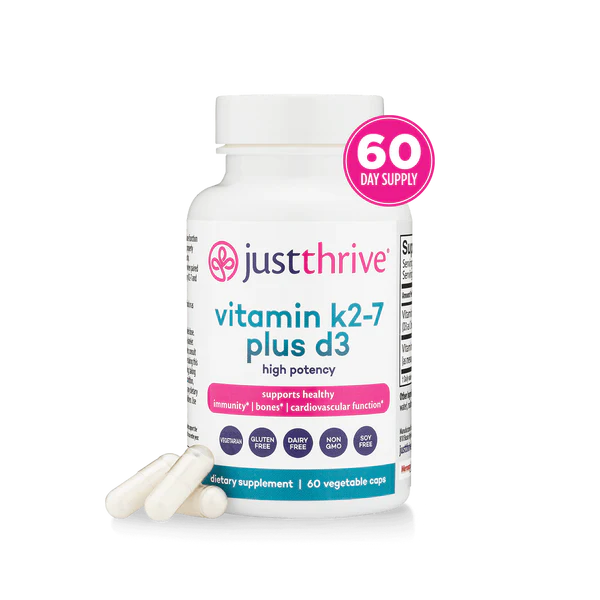
Stay One Step Ahead and Stay Healthy!
Unlock your proactive wellness potential with high potency Vitamin K2-7 and Vitamin D.
Magnesium
Magnesium is the fourth most abundant mineral in the body and is essential to good health.
While studying at The Institute for Integrative Nutrition, I learned from Paul Pitchford that,
No calcium goes into bones without magnesium.This is why people in China have much stronger bones than people in America: They get a lot more magnesium. They eat a lot less calcium. But the magnesium is key.
If constipation is your issue, I’d highly recommend you think about supplementing with magnesium.
Staying constipated is one of the worst feelings, and it’s awful for the body.
In fact, if you have IBS-C, you are much more likely to set up for things like SIBO and even Colon Cancer, since waste isn’t clearing through the body at a normal rate.
Be sure you are educated on it enough prior to taking.
The NIH (National Institutes of Health) has a great resource on magnesium as it relates to possible drug interactions, recommended amounts, deficiency symptoms, who might need more of the mineral, etc.
In the A Gutsy Girl supplement line we offer a product centered around magnesium called Move Now.
This supplement contains chelated magnesium glycinate, otherwise known as magnesium biglycinate.
Magnesium biglycinate is one of the most readily absorbed forms of magnesium and is so incredibly easy on the GI tract.
Its chelation helps bump up the absorption value and reduces interaction with other nutrients.
Now, if you’re looking for more beyond this for some specific conditions, here is what I can offer:
- Leaky Gut Supplements
- Best Supplements for IBS Bloating
- 15 Supplements for Intestinal Lining Support
- Best Supplements for SIBO (based off experience + research) (small intestine problems)
- Best Time to Take Vitamins and Supplements
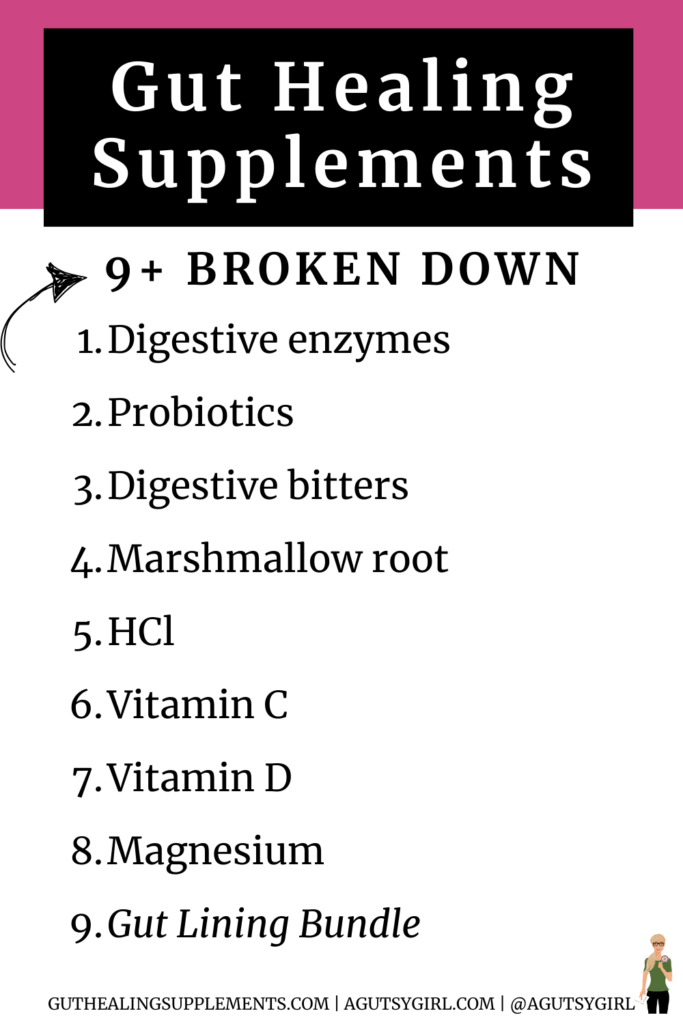
You Can’t Outrun a Bad Diet
Let’s return to the beginning of this article and the idea that supplements are the wrong approach.
They are NOT the wrong approach when you use them in conjunction with all other factors.
But they ARE the wrong approach when you silo them off.
So, don’t silo them off. Instead….
Here are the other factors to use in conjunction with supplements:
- Diagnosis: Supplement based off what you have been diagnosed with. Digestive issues won’t get better if you don’t know what you’re dealing with. For over a decade I thought it was “just IBS.” Turns out, it was SIBO, leaky gut, a low-functioning thyroid, and Colitis. Knowing those for sure changed the entire trajectory of my healing efforts.
- Diet: A poor diet will keep you sick no matter what. You have to learn what the best diet is for you. This is also key: for you. NOT what a template or influencer tells you.
- Lifestyle: Our healing can be found in the daily routine. What does yours look like? How are you sleeping? What are your stress levels like? And even, what personal care products and home cleaning supplies do you use? Yes, they all matter.
And by the way, the above (diagnosis, diet, and lifestyle) are my THREE fundamental pillars for gut health.
I teach everything you want to know about the three pillars in Gut Healing: ELEVATED. And I take you through the process of understanding it all, one day at a time. It’s a long-term approach with some quick relief, short-term hacks.
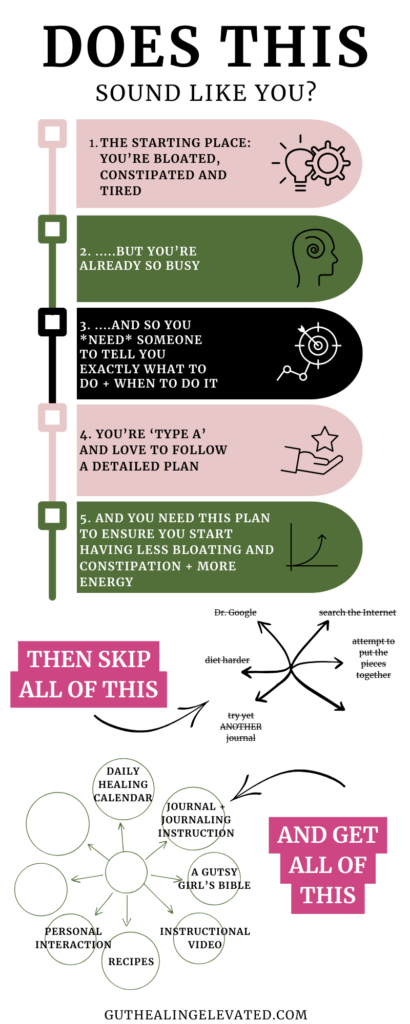
Discover the SIMPLE, easy-to-follow system that allows you to say goodbye to bloating, fatigue, and gut problems and REDISCOVER the joy of living using a 4-week framework.
This course isn’t like any other course / membership / subscription.
It’s a process that will guide you from awful bloat and misery to finding the inspiration and answers that have been keeping you stuck….
So that you can live life on YOUR terms once again.
If you liked this post on gut healing supplements, you might also enjoy:
Xox,
SKH
🤰 bloating be gone! weight loss through optimal gut health for women
💃ʜᴇᴀʟ ʏᴏᴜʀ ɢᴜᴛ. ʜᴇᴀʟ ʏᴏᴜʀ ʟɪfe.
🫶🏻 founder gutbyome.com

